'Minimum wage has no part to play in care'
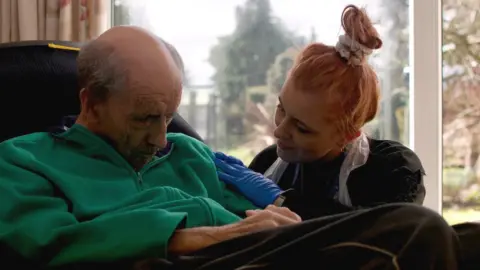 BBC
BBCThere are thought to be more than 165,000 vacancies in adult social care in England, which is a jump of 52% in a year. So how can people be attracted to the industry at a time when increasing numbers of people need care in their own homes?
The care industry has plenty of issues to confront.
There is increasing demand for support in the community, and not enough people wanting to work as carers.
A spotlight is being shone on low rates of pay and there are clear difficulties in retaining staff.
Now one care agency in Staffordshire, formed two-and-a-half years ago, says it is determined to address these issues.
'You should not be entering a profession like this on a minimum wage'
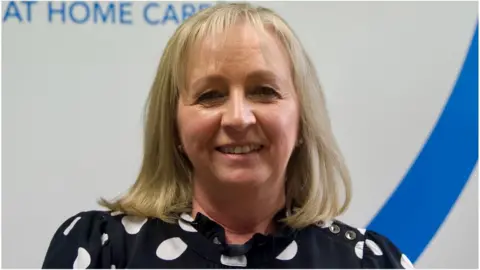 BBC
BBCFor the past two-and-a-half years, Helen Lofts has been co-owner of Visiting Angels, in Burton-upon-Trent, and she sees caring for her own staff as a massive priority.
"This is a skilled job and needs to be rewarded accordingly," she said.
"Minimum wage has no part to play in care as far as Visiting Angels is concerned.
"We are out to change the face of care, and that starts by recruiting your carers, paying them accordingly and treating them in the right way."
A care worker in England is paid on average £8,000 a year less than NHS staff with the same skills, research for a care provider suggested in December.
And many pay packets hover around minimum wage levels, which for workers aged 23 and over will rise from £9.50 to £10.42 an hour next month.
 BBC
BBCAt Visiting Angels East Staffordshire, bosses have increased care client fees by 13% in part to ensure their 21 staff receive an hourly rate at least £2-£3 above the minimum wage.
"Business costs are also up by an average of 15% and we raised our pay rates by 15-17%," said Ms Lofts.
"It is a model that's working. And it is about retaining the staff, because if you can retain the staff, you're not then forking out the money to keep recruiting new staff.
"It's a lot better to spend the money on the staff that you've got and already value."
She added: "We pay them mileage between their calls, we pay them travel time between their calls. We pay their MOTs and we pay towards the servicing of their cars.
"If you value your carers, they will stay with you. And it's not just about pay, it's about support in so many different ways."
Many of Visiting Angels' clients are self-funded, but some top up their local authority payments to receive their care.
'It's a really rewarding job'
 BBC
BBCErin Woodhouse's passion for working as a carer comes from the impact of illness at the heart of her family.
"My dad has multiple sclerosis so I've seen first-hand my mum care for my dad, and me helping out in between my university studies," she said.
"And I thought I'd like to take that role on myself and help other people and gain a little bit of experience in this sector."
The 23-year-old added: "I think we get paid pretty well to be honest. I think it does show what we're worth.
"But a lot of care companies only pay minimum wage."
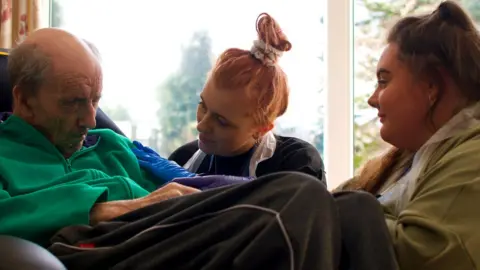 BBC
BBCThe government said it was "incredibly grateful" to carers and recognised their "extraordinary commitment".
A spokesperson added: "That's why we prioritised social care in the Autumn Statement, providing up to £7.5bn over the next two years."
"I don't think you can really understand the nature of the job until you've actually done this job," said Ms Woodhouse.
"I didn't really understand what care givers really go through until doing this job myself."
She added: "We get to meet so many different people, and you do get to become part of their family too."
'They look after David absolutely beautifully'
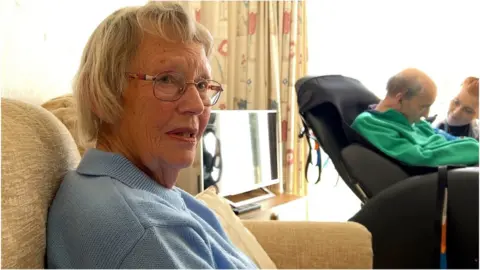 BBC
BBCBeryl Pipe's husband David had a heart attack 23 years ago. He is confined to a chair and unable to speak.
"The carers are absolutely invaluable. I certainly could not manage without them," she said.
"I've managed to look after him for 21 years, but then he got too bad for me that I just could not manage any longer."
She added: "It does cost quite a lot of money. It soon adds up and you're talking thousands over a year.
"But I couldn't be without it."
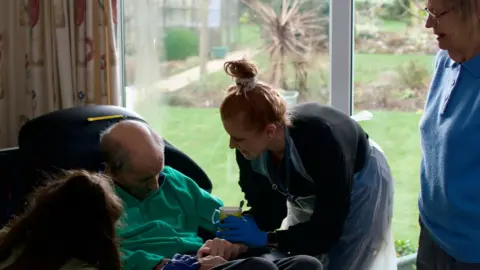 BBC
BBCCouncillor David Fothergill, chairman of the Local Government Association's Community Wellbeing Board, said: "The adult social care sector is facing significant financial and workforce challenges.
"Councils across the country are working with local care providers to understand their pressures and identify ways to best support the sector, including through the council tax precept and other funding.
"We have consistently said that £13bn is needed for social care so that its many pressures can be addressed and councils can deliver on all of their statutory duties."

Follow BBC West Midlands on Facebook, Twitter and Instagram. Send your story ideas to: [email protected]
